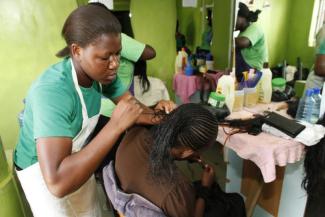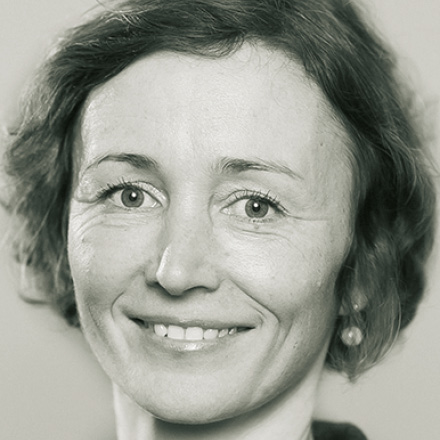International Cooperation
INGOs in Africa

In Africa, the number of civil-society organisations (CSOs) has increased tremendously in the past decades. One reason was that government support for social programmes declined as a consequence of the structural adjustment policies that were demanded by the World Bank and the International Monetary Fund in the 1980s and 1990s. To some extent, non-governmental organisations (NGOs) managed to fill the gaps.
International non-governmental organisations (INGOs) play a big role in strengthening African CSOs, for instance by enhancing capacities. African CSOs, in turn, lobby governments and empower communities to campaign for better policies and improved livelihoods.
As they offer leadership, governance, management skills and material supply, the role of INGOs is important. In fact, donor governments have increased their funding to INGOs because these agencies are in touch with various communities in developing countries through their local-level counterparts.
INGOs help national NGOs to network and build linkages, making them stronger advocates for far-reaching reform policies. Moreover, INGOs have a bearing on the policies of donor governments and facilitate the engagement of African CSOs with donor governments.
National-level CSOs often serve as subcontractors for INGO projects or project components, but many also get support for running programmes of their own. Measures are particularly effective when international and national partners interact intensively and foster a spirit of cooperation. Joint action makes change visible. Over the years, INGO funding for local CSOs, including faith-based ones, has increased.
INGOs do more than mobilise funds and transfer skills and knowledge. They boost the voice of African CSOs. Many African countries lack social justice, and many governments make it difficult for local NGOs to engage in advocacy. Cooperation with INGOs results in some protection for African activists. Amnesty International, Human Rights Watch and other INGOs often make the international community aware of repressive action by national governments. Unfortunately, there is a trend of governments becoming increasingly authoritarian all over the world, including Kenya.
INGO advocacy has promoted the cause of community participation and civic engagement. INGOs speak for the developing world through advocacy. They speak out against abuses of power and demand the rule of law as well as good governance. INGOs have thus been on the forefront in suggesting concrete, integrated strategies as well as supporting those calling for change.
In Kenya, such engagement has helped CSOs contribute to democratisation during the transition from a one-party regime to multi-party democracy in the 1990s. Faith-based organisations, for example, were vocal in calling for good governance and urged the government to open up space for other political actors. Some CSOs provided protection for people who organised protests. More recently, Kenyan CSOs are credited for spearheading the constitutional review process which had stalled for decades, but finally resulted in the new constitution that was passed in 2010.
The interaction of international and national NGOs, moreover, has contributed to raising awareness for how issues of peace, the rule of law and social justice are interrelated. Today, INGOs probably matter most in Kenya’s most marginalised areas. In some parts of northern Kenya, for instance, organisations such as World Vision, Action Aid and others provide social services including relief food and water. They assist people when disasters like floods, droughts and famine strike, delivering essential services in places that the national government largely tends to ignore.
Micro-management and competition for staff
For a long time, local NGOs mostly implemented programmes, while their international counterparts did the fundraising and some advocacy. Local groups, however, have become more self-confident. Accordingly, the interaction of national and international organisations has been changing.
A huge number of African NGOs came up in the early 1990s. At the time, most of them failed to deliver services effectively and efficiently. Their capacities were quite limited, and donors insisted on prudent use of funds. For good reason, they still demand solid accounting and financial reporting. INGOs have developed sophisticated systems to ensure compliance with their requirements. Their requirements can lead to tensions and conflict however, as African organisations sometimes feel sidelined. National-level activists often consider the rules too strict. It is necessary to strike a balance between the needs of all parties concerned, involving African organisations in decision-making related to procedural rules.
Some INGOs have set up offices in Africa, not least in order to stay in control of the financial flows. The problem is that those offices all too often start to micro-manage things, thus undermining the ownership of national NGOs and limiting the scope for capacity building. When an INGO has an office in an African country, its staff is likely to visit projects more often. To some extent, this enhances monitoring, but the risk of INGO managers taking too many decisions is great. Moreover, INGO priorities begin to trump local priorities. Especially the growth of small national-level CSOs is thwarted by such practices.
Making matters worse, INGO presence in Africa can reduce local agencies’ scope for resource mobilisation. INGOs are better placed to submit bids to embassies, other agencies of donor governments and supranational institutions. Obviously, their understanding of donor languages and their knowledge of donor regulations helps them. Moreover, local INGO offices tend to recruit the most competent staff, poaching professionals from local CSOs that cannot offer competitive salaries and working conditions.
Some INGOs have decided not to establish African offices but to rely on African consultants instead. Bread for the World, the Protestant German agency, is an example. The consultants do not only handle financial reporting and related matters, but also contribute to developing national CSO capacities. This arrangement ensures that national-level CSOs play their role effectively and deliver much impact.
Generally speaking, the heavy presence of INGOs is sometimes perceived as an attempt to eclipse African NGOs. To avoid conflicts, it is good to have more intensive collaboration and involve all parties concerned in funding activities. Transparency is essential too. Fortunately, communication between INGOs and local-level organisations has generally improved. African partners are no longer passive and timid recipients, but have become active partners that want to take part in agenda setting.
Agnes Abuom is the executive director of TAABCO Research and Development Consultants in Nairobi. She has worked on assignment for Bread for the World and other international non-government organisations. She is also the moderator of the Central Committee of the World Council of Churches.
taabco@taabco.org














